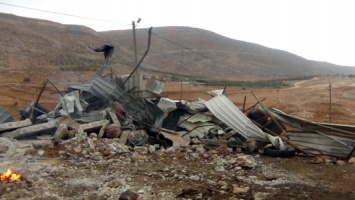- About
- News
-
Advocacy
- Accountability & Litigation
- International Advocacy
- National Advocacy
- Documentation
- FAI Unit
- Al-Haq Publications
- Library


- About
- News
-
Advocacy
- Accountability & Litigation
- International Advocacy
- National Advocacy
- Documentation
- FAI Unit
- Al-Haq Publications
- Library
 In the past week, Al-Haq documented two cases of house demolitions in the Jordan Valley. On 20 November, Israeli forces raided the village of al-Jiftlek, north of Jericho, and demolished a house, a residential structure and four agricultural barracks. On 19 November, the Israeli authorities issued demolition notices to nine residents in Bardala village in the Jordan Valley for their residential and agricultural barracks. Both villages are situated in Area C and were subject to demolitions and demolition notices due to lack of building permits for their structures. According to a report published by the United Nations Office for the Coordination of Humanitarian Affairs (UN OCHA) in January 2013, Palestinian communities in Area C are among the most vulnerable in the West Bank due to the demolitions and forced evictions carried out by the Israeli authorities. Even though there are approximately 150,000 Palestinians living in Area C, Israel designates only one percent of the land for Palestinian development.
In the past week, Al-Haq documented two cases of house demolitions in the Jordan Valley. On 20 November, Israeli forces raided the village of al-Jiftlek, north of Jericho, and demolished a house, a residential structure and four agricultural barracks. On 19 November, the Israeli authorities issued demolition notices to nine residents in Bardala village in the Jordan Valley for their residential and agricultural barracks. Both villages are situated in Area C and were subject to demolitions and demolition notices due to lack of building permits for their structures. According to a report published by the United Nations Office for the Coordination of Humanitarian Affairs (UN OCHA) in January 2013, Palestinian communities in Area C are among the most vulnerable in the West Bank due to the demolitions and forced evictions carried out by the Israeli authorities. Even though there are approximately 150,000 Palestinians living in Area C, Israel designates only one percent of the land for Palestinian development.
On 20 November, Israeli forces raided Khirbet al-Twayyel, east of ‘Aqraba village, approximately one kilometre away from Nablus, and demolished a water tank and an agricultural barrack. Previously, on 29 October 2013, Israeli military forces, along with the Israeli Civil Administration, bulldozed two water tanks, two barracks, a cement wall and a residential structure in Khirbet al-Twayyel. The total value of structures and barracks demolished on 29 October amounted to approximately 142,000 Shekels (40,000/USD).
Yousef Mousa Diriyyah – ‘Aqraba village
On the morning of 20 November, Yousef, 37, an employee in ‘Aqraba Municipality, received a phone call from Basem Bani Jaber, the Khirbet al-Twayyel representative for the ‘Aqraba Municipality, informing him that Israeli forces had arrived in the area with the intention of demolishing the residents’ structures. According to the Israeli forces, the structures were to be demolished because they were built in Area C without building permits.
Yousef rushed to the scene and arrived in Khirbet al-Twayyel at 6:30 am. There, he found four Israeli military jeeps, three vehicles belonging to the Israeli Civil Administration (ICA) and two bulldozers stationed near a cement water tank. The water tank was owned by ‘Imad al-Din Minyah. The Israeli bulldozers proceeded to demolish ‘Imad’s water tank and, when it was completed, buried the rubble under soil and rocks.
The Israeli forces retreated from the area at approximately 11:00 am, five hours after the demolition process had begun. Later, Yousef learnt from the residents that prior to his arrival an agricultural barrack had also been demolished by the Israeli forces. The barrack belonged to Samer Bani Jaber and had been under construction since 2008. (Al-Haq Affidavit No. 9151/2013)
‘Imad had been using the water tank for 11 years before it was demolished. Both Samer and ‘Imad were given a written notice to halt construction by the ICA in 2008. Neither had applied for a building permit as they did not believe they would be granted one. The Israeli Civil Administration has rejected 94 percent of permits applications for Palestinians in recent years, according to a report published by OXFAM in 2012. The same report states that development in the area is constrained because it is impossible to gain permits to build homes, toilets, wells, animal pens and other vital infrastructure for local communities. The total value of demolished property on 20 November amounted to 50,000 Shekels (approx. 14,000/USD) for ‘Imad and 10,000 Shekels (approx. 3000/USD) for Samer.
Al-Haq strongly condemns acts of demolition by the Israeli authorities, which displace communities and are in violation of international law. As the Occupying Power, Israel must adhere to its obligations under international humanitarian law, including the Fourth Geneva Convention, which prohibits the destruction of property unless it is absolutely necessary for military operations. Furthermore, demolitions leading to the forcible transfer of individuals or communities constitute a grave breach of the Fourth Geneva Convention.
